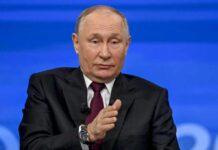
Ukrainian President Zelenskyy appeals to Trump to broker peace with Russia as diplomatic efforts stall and battlefield tensions escalate.
At a Glance
- Zelenskyy has urged former President Trump to use his influence to pressure Russia into meaningful peace negotiations
- Trump previously promised to end the Ukraine conflict “in one day,” but diplomatic efforts have shown little progress
- Ukraine recently conducted a surprise drone attack on Russian airfields, potentially complicating peace efforts
- Russia and Ukraine remain at odds over territorial disputes, with both sides rejecting various peace proposals
- The U.S. role in negotiations has been described as “relatively weak” by security experts
Zelenskyy Reaches Out to Trump
Ukrainian President Volodymyr Zelenskyy has made a direct appeal to former President Donald Trump to step in and use his influence to broker peace between Ukraine and Russia. Despite previous tensions between the two leaders, Zelenskyy has expressed confidence in Trump’s ability to make progress where others have failed. The Ukrainian president emphasized that strong American leadership is essential to bringing Russian President Vladimir Putin to the negotiating table in good faith.
“I am convinced that the president of the United States has all the powers and enough leverage to step up,” said Volodymyr Zelenskyy.
The appeal comes as Ukraine faces increasing pressure on the battlefield and diminishing international support. Trump, who has maintained his promise to quickly end the conflict if returned to office, recently spoke with Putin following Ukraine’s drone strikes on Russian territory. This communication has raised questions about Trump’s approach to the conflict and his willingness to pressure Russia rather than Ukraine.
Stalled Peace Efforts
Previous attempts at negotiation have yielded little progress. Direct talks between Russia and Ukraine in Istanbul resulted in a prisoner exchange but failed to address the core territorial disputes. A proposed U.S. peace plan was rejected by both Russia and Ukraine, highlighting the challenges facing any mediator. Russia’s position has been strengthened by battlefield gains, while Ukraine struggles with ammunition shortages and reduced Western support.
“It would fundamentally shift the balance of power in the war to the Russian side,” said Seth Jones regarding the impact of reduced U.S. support.
The U.S. has suspended aid and intelligence sharing with Ukraine, potentially weakening Kyiv’s position. Zelenskyy has proposed a limited 30-day ceasefire without conditions, expressing willingness to forgo U.S. security guarantees if Russia reciprocates. However, Russia has responded with one of the largest drone and missile strikes since the war began, demonstrating Putin’s reluctance to engage in meaningful peace talks.
I spoke with @POTUS twice today. First, we had a one-on-one call before his conversation with the head of Russia, and later we spoke together with President Trump and European leaders President @EmmanuelMacron, Prime Minister @GiorgiaMeloni, Federal Chancellor @bundeskanzler,… pic.twitter.com/mm6a0Pro84
— Volodymyr Zelenskyy / Володимир Зеленський (@ZelenskyyUa) May 19, 2025
Operation Spiderweb and Rising Tensions
Ukraine’s recent surprise drone attack on Russian airfields, codenamed “Operation Spiderweb,” has added another layer of complexity to potential peace negotiations. Zelenskyy has defended the operation as a legitimate military action using only Ukrainian weapons, targeting military sites to strengthen Ukraine’s negotiating position. The operation reportedly damaged Russian bombers, though U.S. assessments suggest the damage was less extensive than Ukraine claimed.
In response to the drone strikes, Putin reportedly told Trump that Russia “will have to respond,” raising concerns about further escalation. Trump’s characterization of the conflict as akin to a schoolyard fight between children has drawn criticism from Zelenskyy, who emphasized the real human suffering caused by Russian aggression. Despite these tensions, Zelenskyy noted improved relations with Trump after a productive meeting at the Vatican.
Path Forward
The road to peace remains challenging, with both sides firmly entrenched in their positions regarding territorial disputes, particularly over Crimea and eastern Ukraine. U.S. Secretary of Defense has suggested Ukraine might have to cede territory, a position Zelenskyy has firmly rejected. The Ukrainian president has advocated for stronger sanctions against countries buying Russian energy, emphasizing the need for U.S. leadership in maintaining pressure on Moscow.
“Then they will stop the war,” stated Zelenskyy, expressing his belief that only strong pressure from the U.S. and European allies could make Putin pragmatic enough to end hostilities.
With Ukraine invited to an upcoming NATO summit that Trump is expected to attend, diplomatic efforts continue despite the battlefield challenges. The success of any peace initiative will depend largely on Trump’s willingness to exert pressure on Russia rather than forcing Ukraine into unfavorable concessions. As winter approaches, the humanitarian situation in Ukraine becomes increasingly dire, adding urgency to Zelenskyy’s appeal for Trump’s intervention in the peace process.

























